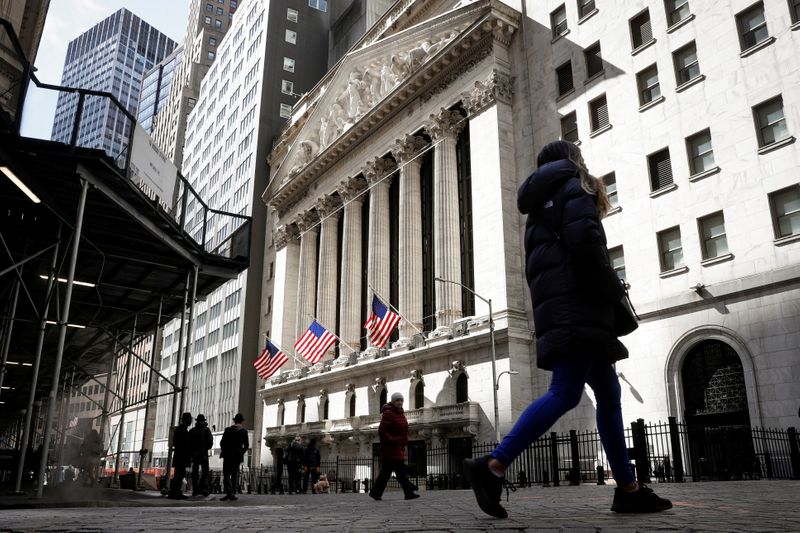By Stephen Culp
NEW YORK (Reuters) - U.S. stocks closed lower on Tuesday as rising commodity prices and labor shortages fed fears that despite reassurances from the U.S. Federal Reserve, near-term price spikes could translate into longer-term inflation.
While all three indexes pared their losses from session lows, the sell-off was fairly evenly dispersed across the sectors.
"Today feels like a catch-up in that tech has been weak so far this month and it’s finally spilled over into other areas of the market and we’re seeing broader weakness," said Ryan Detrick, senior market strategist at LPL Financial (NASDAQ:LPLA) in Charlotte, North Carolina.
Economic data released on Tuesday from the Labor Department showed job openings at U.S. companies jumped to a record high in March, further evidence of the labor shortage hinted by Friday's disappointing employment report.
The report suggests labor supply is not keeping up with surging demand as employers scramble to find qualified workers.
Burrito chain Chipotle Mexican Grill (NYSE:CMG) announced it would hike the average hourly wage of its workers to $15, a further sign that the worker shortage in the face of a demand revival could add fuel to the inflation surge.
That worker shortage, along with a supply drought in the face of booming demand could contribute to what is seen as inevitable prices spikes, which the U.S. Federal Reserve has repeatedly said are unlikely to translate into long-term inflation.
"The inflation concerns continue," Detrick said. "The supply chain issues coupled with record stimulus coupled with apparently a tighter labor market have all contributed to fears that inflation could trend higher over the summer months."
"I don’t think (the market) believes the Fed when it says they won’t raise rates until after 2023," Detrick added. "That could be where the market and the Fed do not see eye to eye."
Market participants will scrutinize the Labor Department's CPI report, due early Wednesday, for further signs of potential inflationary pressures. (Graphic on inflation) https://tmsnrt.rs/2SxpkST
The Dow Jones Industrial Average fell 473.66 points, or 1.36%, to 34,269.16, the S&P 500 lost 36.33 points, or 0.87%, to 4,152.1 and the Nasdaq Composite dropped 12.43 points, or 0.09%, to 13,389.43.
Of the 11 major sectors in the S&P 500, only materials ended the session green. Energy suffered the largest percentage loss, closing down 2.6%
The CBOE Volatility index, a measure of investor anxiety, closed at 21.85, its highest level since March 11.
Boeing (NYSE:BA) Co lost 1.7% after the planemaker announced deliveries of its 737 MAX fell to just four planes in April due to an electrical problem.
Tesla (NASDAQ:TSLA) Inc continued its slide, dropping 1.9% following the electric automaker's decision to expand its Shanghai plant owing to heightened U.S.-China tensions.
Mall REIT Simon Property Group Inc (NYSE:SPG) fell 3.2% after the company said it does not expect a return to 2019 occupancy levels until next year or 2023.
L Brands Inc (NYSE:LB) announced it will split into two publicly traded companies, Bath & Body Works and Victoria's Secret. Its stock dropped 1.8%.
Declining issues outnumbered advancing ones on the NYSE by a 2.85-to-1 ratio; on Nasdaq, a 1.62-to-1 ratio favored decliners.

The S&P 500 posted seven new 52-week highs and one new low; the Nasdaq Composite recorded 28 new highs and 224 new lows.
Volume on U.S. exchanges was 11.78 billion shares, compared with the 10.33 billion average over the last 20 trading days.